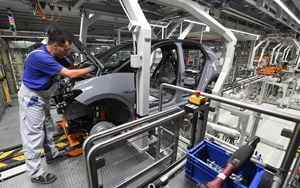(Finance) – The decision of Bosch to cut 700 jobs in the next 5 years in Bari plant which mainly produces components for engines diesel it will not remain an isolated case. The transition of car manufacturers towards new electric engines, in fact, risks opening up a chasm of employment in the Italian and European automotive sector, especially if the electrification of the 4 wheels is not managed.
“Today in Bari broke out the first corporate crisis in Italy caused by the transition to the electric car. The transition to the electric car accelerated too quickly, which is crushing the entire automotive industry. The difficult prospect represented by Bosch. in Bari is a consequence of this rapid transformation of the market and of drastic European policies, which penalize Italy more than other countries, because Italy is the second manufacturing reality in Europe “, is the position expressed by the president of Confindustria Puglia, Sergio fountain.
The occupation alarm in the transition electric has long been known in the sector and meets the concerns of all the players involved, including workers and environmentalists. In this regard, in recent weeks the European Association that brings together automotive suppliers, CLEPApublished a relationship developed by PwC Strategy & to assess the impact of the Green Deal on employment and value added among car suppliers across Europe in the period 2020-2040.
The first factor that highlights the report is that “while the homes automotive have a greater ability to divest or allocate assets to compensate for a loss of engine business, automobile suppliers may react with much less agility, as they are bound by long-term contracts with vehicle manufacturers. “To this element if he adds another, namely that “in addition to global and well-capitalized industry leaders, the sector is made up of hundreds of specialized companies And SMEs with less access to capital to invest in transforming their business models. “
The study therefore predicts that in a scenario in which the European Union focuses exclusively onelectric car to decarbonise transport, 70% of the employment impact will be felt already in the period 2030-2035 and demonstrates that the opportunities of electric vehicles depend on the creation of a deep battery supply chain in the EU, timing and probability of which are still uncertain. “Western European countries appear to be in the best position to be strongholds in EV powertrain production, while employment in Central and Eastern European countries will remain heavily reliant on the internal combustion engine,” the report said.
The CLEPA report highlighted 70% of the value creation related to thrusters electrical (up to 70 billion euros) will be linked to the processing of the materials of the batteries, to the production of cells and modules and their assembly. “It is important to underline – reads the report – that these activities will not necessarily be with the same companies or in the same regions, as they require skills significantly different from conventional powertrain technology and are therefore unlikely to provide opportunities for most providers automakers oriented towards this motorization, in particular small and medium-sized enterprises which employ about 20% of the people working in the automotive supply sector “.
“A approach technological open should include rapid electrification with clean and renewable energy, complemented by clean combustion technology with sustainable renewable fuels – said the president of the Association’s president, Sigrid de Vries -. There are more options beyond zero tailpipe emissions and we need to recognize the role climate-controlled fuels can play in reducing emissions, preserving consumer choice, affordability and maintaining Europe’s global competitiveness. The enemy here is not technology, but rather fossil fuels and technological openness will be key to ensuring a just transition. “
